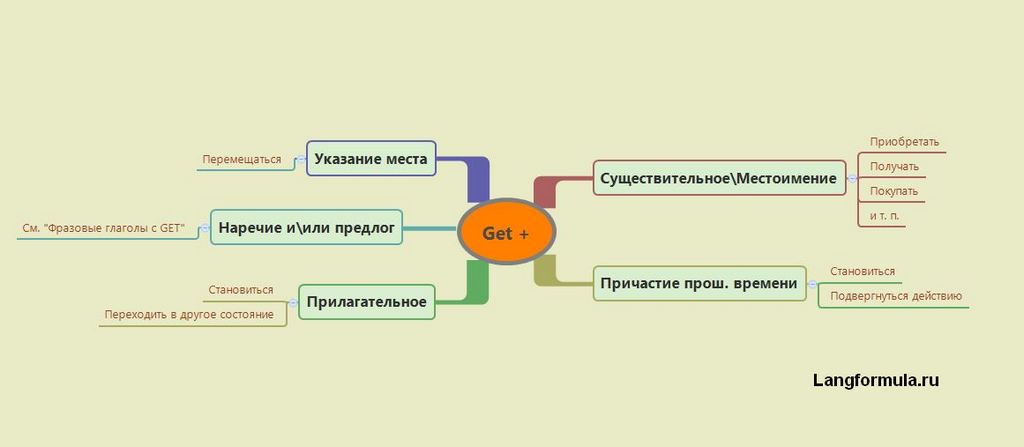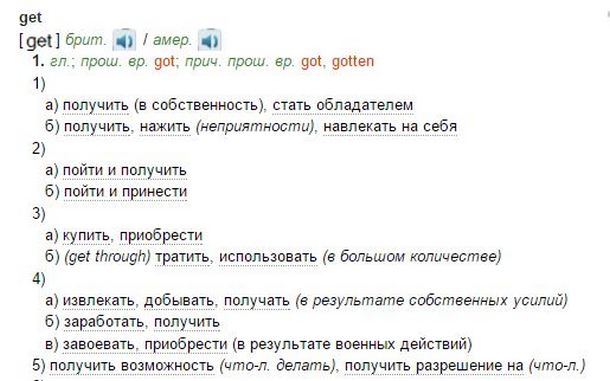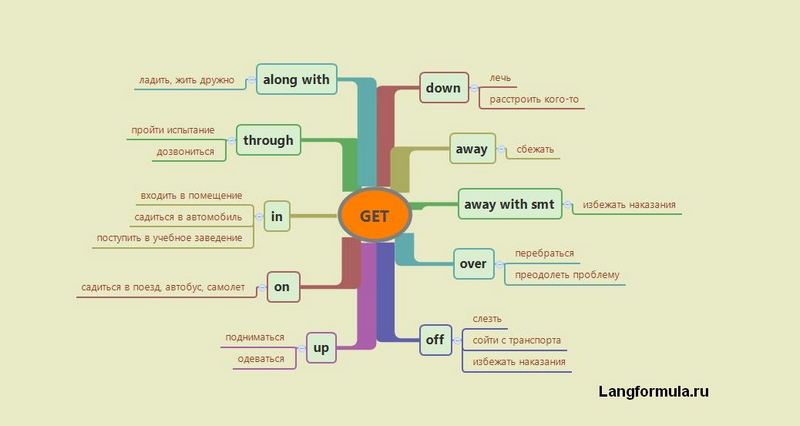Get is a power word in the English language.
There are so many different meanings. This might be confusing for you as an English learner. But it’s important to learn how to use this word.
In this lesson, you’re going to learn 10 of the most common ways this word is used. And then, I’m also going to share some idioms with you.
The key to all of this is to learn the sentences. That way, you will internalize this word and how to use it. Learn more about to do that at the bottom of the post.
For now, watch the video and then take the lesson below.
10 Ways to Use the Word GET in English
Here are the ways in which we use get in English. Read the definitions and the examples. And then, see the collocations and idioms too.
Gain possession of / buy
Look behind me. Recently, I got some new things for my office. I got these *cough* fake plants, neon light, wall decorations… this means that I bought these things. Here are more examples:
- What did you get for your birthday?
- I’m thinking about getting a new car soon.
- I haven’t got my wife anything for Christmas yet – I’m starting to panic!
To become ill or have an illness
Yes, you can say catch a cold but it’s more common to say get a cold. Here are more examples:
- I’ve got a cold
- She keeps getting sick
- I’ve got a bit of a headache today.
Click here to learn more about sickness vocabulary. Or watch below:
To obtain and/or bring something to someone
This is something that is used a lot at home. For example:
- Could you get me a tea?
- Could you get me the remote?
- If you have time, get me some bananas on your way home (first conditional)
- Get some breakfast and then we’ll go
An alternative here is to bring up or down. For example, could you bring me up a cup of tea?
To hear or to understand
Listen to this: Time flies like an arrow, but fruit flies like a banana. You can respond to that by saying, “I’m sorry. I didn’t quite get that.”
- I don’t get what you mean. Could you explain that again?
- I didn’t quite get that – could you speak up?
To become (change)
This is really useful. Look at this example:
- It’s getting dark
It’s not dark now but it’s changing from light to dark. We use get to talk about a change.
- Your tea’s going getting cold. I’d drink it now*
- It’s getting hot out there
- Yawn. I’m getting tired.
*My wife and I talk about PDT: perfect drinking temperature. This is when the tea isn’t too hot and it’s too cold. It’s just right.
To learn more about how to talk about the weather, click here.
Movement
A good example of this is this one:
- What’s wrong with you? Why are you hobbling?
- I stubbed my toe getting into bed.
Here are more examples:
- Get down!
- Get your hands out of your pockets.
- I stubbed my toe getting into bed
- Let’s get outside – it’s beautiful out there
To leave public transport
After you get on a train you… get off it.
- Let’s get off here
- Where do we get off if we’re going to Big Ben?
- Get off at the next stop
This can be a little confusing. Because you get out of a car but get off a train. You get in the car but on a train.
This is why it’s important to learn English through sentences. And if you want to get audio sentences from this lesson – along with flashcards and many other resources – join TFP.
Arrive
Now speaking of traveling, when you arrive at your destination, you can use get here too.
- When is David going to get here?
- When mum gets here, turn off the TV, okay?
- Come on, let’s get going, we’ll get there really late otherwise.
- I hope my package gets here today.
To Receive or Be Given Something
- Let me know what you get in that quiz
- I got my hair cut yesterday – what do you think?
- I got my acceptance letter yesterday!
Collocations with Get
Collocations are simply two or more words that go together naturally. For example, you take a quick shower not a fast shower.
Now, some of the following can be explained through rules, but it’s important to learn them more naturally. To internalize them and to be able to use them instantly during natural conversation.
With that in mind, here are some of the more common collocations with get:
Get Married
This means to be joined in marriage. Notice the difference between to be married and to get married from the following examples:
- They got married last year
- They’re married
The first one talks about the act of getting married. The second focuses on the situation. Here are more examples:
- When are you going to get married?
- We’re getting married next year
That last example is in the present continuous. We use the present continuous to talk about future events.
Get Ready
There are two definitions here. Firstly, it can mean to put on clothes. For example, come on, get ready. We have to leave soon. Here are more examples:
- It takes her forever to get ready
- How long does it take you to get ready?
- I’m getting ready – almost done!
It can also mean prepare. Imagine that you’re throwing a party for the World Cup Final. You might say, we need to get the house ready for our party. Here are more examples:
- Can you get the presentation ready for tomorrow?
- Get ready… this is going to be a tough exam.
Get home/in
Before, you learned that we use get when we arrive somewhere. To get home is a good example of this:
- Come on, let’s get home
- What time did you get in last night?
- Is he getting home tonight?
Get some/any sleep/rest
Let’s get home and get some rest. This just means to sleep or to rest. We often use some/any in between get and sleep/rest. Here are more examples:
- I just need to get some sleep
- Do you think we’ll get any rest next week?
- I didn’t get any sleep last night
Get into trouble
Look at this example: He’s always getting into trouble! This means that he’s always misbehaving and either their parents, the police, or their teachers are punishing them.
Here are more examples:
- He got into a lot of trouble as a kid but he’s good now
- Try not to get into trouble tomorrow!
- What can we do to stop you from getting into trouble?
This can also mean to fall into difficulty.
- If you get into any trouble when traveling, call me straight away!
- We got into some financial trouble last year but we managed to get out of it.
Idioms with the Word Get
There are many idioms that include get. Let’s have a look at some of these now.
Get to the bottom of something
This means to discover the truth about something – often when the truth is hidden or hard to find.
It’s used in formal situations, mainly. For example, if things have gone missing at a school but no one knows why, the principal might say: we need to get to the bottom of this.
More examples are:
- The police are trying to get to the bottom of who committed that crime
- Let’s get to the bottom of this, ASAP
Get the hang of
This means to learn how to do something. For example, it didn’t take me long to get the hang of driving on the right side of the road. Or the wrong side…
- It might take you a little time to get the hang of how to use get but if you follow my methods you’ll definitely get there
- I just can’t get the hang of it
Get a kick out of something
To enjoy something – to find something amusing.
- Are you getting a kick out of me falling over?
- I still get a kick out of Blackpool losing
Over to You
There’s a lot to learn in this lesson. Knowing how to use GET can help. But the key to being able to use these sentences naturally, flexibly and fluently when speaking is to repeat the phrases until you memorize them.
That is where my program can help. You can get premium resources based on this lesson here. We’d love to have you!
Thank you for reading. Please share this lesson below!
Download the worksheet!
Hello students, and welcome to day 2 of our mini-course on words with multiple meanings!
Yesterday’s word was RUN, and today we’ll focus on GET. Again – a very common word, but one that is extremely versatile – this means it can be used in lots of different ways.
You already know the basic meaning of GET, but today you’re going to learn 20+ more ways to use it. Let’s get started:
get = receive
“Get” means receive. You can:
- get a gift
- get an email
- get a chance (meaning to receive an opportunity)
- get a grade on a test
- get an award
- get a scholarship
There are lots of collocations with GET meaning “receive.”
get = obtain
A second meaning of get is to obtain. This is a little different from receive – when you receive something, you made no effort – someone else gave it to you. If you get a gift for your birthday, you didn’t do anything to receive it.
But when you obtain something, you put in some effort. So you can get a job (you applied for the job, maybe you did an interview, and then they offered you the job).
You can get information, meaning you go and search for the information so that you have it. You can get some sleep, meaning you take the action of going to bed. You can get results at work, so you’re probably doing tasks in order to obtain results, get results.
get = buy
Get can also mean to buy. You can get tickets to a concert. If you see someone wearing a shirt you like, you can say “Where did you get that shirt?” meaning where did you buy it.
You can get something for a good price or get a bargain on something, both of which mean to pay a fair or small amount of money compared to the high value you receive.
For example, you can get a bargain on the Complete Program at Espresso English, because it’s available at a 50% discount – so you can buy it at a good price.
Another place we use “get” to mean “buy” is when we’re ordering at a restaurant or coffee shop – it’s very common to say “Can I get a large coffee?” or “Can I get some french fries?” – meaning you want to order, you want to buy that food/drink item.
Get tickets for a concert (buy them)
get = bring
We also use get in the sense of bring. If I’m already in bed and I feel cold, I might ask my husband, “Can you get me an extra blanket?” meaning can you bring it to me.
We often say “go get” when someone needs to go somewhere in order to bring back an item. Let’s say there’s a meeting at work, and there aren’t enough chairs in the meeting room – then, my assistant could go get more chairs, meaning she will go and then bring the chairs.
Or if someone’s injured, you might say “I’ll go get the first aid kit!” meaning you’ll bring it.
get = arrive
Informally, we use “get” to mean arrive. For example: I usually get home from work around 6:00 – meaning arrive at home.
You can use “get” when talking about arriving from travel – If we take the next available flight, we’ll get to New York on Monday morning.
When asking for directions, you could say “How can I get to the train station?” – how can I go there, how can I arrive there.
We’ll get to New York by noon.
get = become
Get also means become. You can get angry, get excited, get tired, get sick, get older, and get lost.
Something can get better or get worse, meaning it is becoming better or worse.
We also use it for changes in marital status: two people can get engaged (meaning they plan to marry each other), get married, and get divorced.
You can also get dressed, meaning to put on your clothes, and get ready, meaning to prepare yourself. When you get drunk it means you become intoxicated with too much alcohol, and when you get used to something it means you become accustomed to it.
All these expressions use “get” in the sense of becoming, changing status.
They got engaged last weekend.
get = understand (informal)
Another informal use of “get” is to understand. If you say “I don’t get it,” it means “I don’t understand.”
You can also say “I don’t get…” followed by a question word and the topic you don’t understand, for example:
- I don’t get why they broke up; they seemed to have a perfect relationship.
- I don’t get how to use this computer program.
- Or if someone tells a joke, and you didn’t understand what’s funny about it, you could say you didn’t get the joke.
get to do something = have a special opportunity
If you get to do something, it means you have a good/special opportunity, for example:
- If my kids finish all their homework, they get to watch a movie before bed.
- He’s upset because he didn’t get to take a vacation last year.
have got to do something = have an obligation; should do it
On the other hand, if you have got to do something, it means you need to do it, you have an obligation to do it, or you should do it. This typically sounds like “gotta” in informal spoken English. Here are some examples of “gotta” referring to obligations:
- I’ve gotta pick up my kids from school.
- If you borrow books from the library, you’ve gotta return them.
- That movie is awesome – you’ve gotta see it! (you should, a strong recommendation)
If you borrow books from the library, you’ve gotta return them.
get someone to do something = persuade/convince the person to do it
When you get someone to do something, it means you persuade/convince the person to do it.
- After a lot of discussion, I finally got him to agree with me.
- It’s hard to get my kids to help with housework.
get something done = cause it to happen
Finally, when you get something done, it means you make or cause it to happen. Sometimes this means doing it yourself, and other times it means you cause someone else to do it for you. For example:
- I like to get all my housework done by noon. (This means I finished it myself)
- My car has broken down – I need to get it fixed. (This means I will probably take it to a mechanic and they will fix it)
My car has broken down – I need to get it fixed.
Phrasal verbs with GET
GET is also used in a ton of phrasal verbs… and even many of these phrasal verbs ALSO have multiple meanings! Here’s just a sample of a few common phrasal verbs with get.
To get along with someone means to have a good relationship with them, without conflict. Or we could say the opposite, not get along with someone, meaning two people don’t like each other or have conflict/tension in their relationship.
- I’m glad I get along with all my coworkers.
- I don’t get along with one of my cousins; I find her so annoying.
The phrasal verb get around is used for managing to go places, physically. If you have a broken leg, you would find it difficult to get around on crutches. Some cities, like London, have an extensive public transportation system, so it’s easy to get around, to manage to go from place to place.
It’s hard to get around on crutches.
Next, we have get back. This can mean to return to a place – for example, I’m going shopping at a bunch of stores, and I’m not sure what time I’ll get back.
There’s another meaning for this phrasal verb, and that is when we say get back at someone, it means to take revenge; to do something to hurt a person who hurt us in the past.
The expression get over means to recover emotionally from a difficult experience. If someone you love dies, it would take you a long time to get over it.
Another way to use this expression is as a command, telling someone “Get over it!” – we do this when the person is continuing to be sad/upset over something minor or silly, and we want them to stop obsessing about a minor problem.
When it comes to transportation, we get into / get out of cars, and get on / get onto / get off trains, buses, planes, bicycles, and motorcycles.
We get into a car, but get onto a bicycle
Idioms with GET
To finish up this lesson, let’s look at a couple idioms with get. The word get is used in hundreds of idioms… so this is just a small taste. If you’d like to focus more on idioms, you can join my 300+ Idioms Course for a lot more expressions.
Our first idiom is to get wind of something, which means to learn about or hear about some secret, usually indirectly. Let’s say a teenager is planning to have a party while his parents are out of the house – but then his parents get wind of it, they learn about this secret, when they see a comment he made on social media. They discovered the secret in an indirect way.
When a celebrity or famous person is involved in a divorce, they often try to keep the details private because when the media gets wind of it, then they will publish all the information about it.
Get wind of something = hear about / learn about it indirectly
Another idiom is to get your act together. This means to take action to become well-organized and better-prepared. For example, let’s say your friend Maria has started and stopped studying English many times in the past, never really taking it seriously. She could decide to get her act together by committing to an English course and establishing a regular schedule for studying. She has taken action to be better organized.
One very informal expression you might hear in TV shows or casual conversations is “Get a load of this!” – we say that when we want to call someone’s attention to something that seems especially notable or interesting. If you see a luxury car you know is worth $100,000, you could say to your friend, “Get a load of that car!” because you want your friend to notice it.
Sometimes people also say “Get a load of this” when they are about to share some scandalous information; for example – “Get a load of this – our college professor was fired because he was flirting with one of his students.”
Sometimes when you’re doing a task, you enter a state where you really have all your energy focused on it, you’re totally concentrating on it, and as a result you are working or learning very smoothly and efficiently. Entering this state of concentration is called getting in the groove.
Sometimes when I’m writing English lessons, I get in the groove and the ideas come very easily to my mind because I’m so focused and fully immersed in the task. Or maybe you like to do a big cleaning of your house once a month, you take the whole day to get in the groove and fully clean your house from top to bottom.
get in the groove = enter a state of focused concentration, so that you make progress easily
I hope my lessons can help you get in the groove when it comes to studying English – my goal with Espresso English is to help you learn in a way that’s easy, efficient, and fun. That’s all for today – make sure to tune in for tomorrow’s video on words with multiple meanings.
Download the worksheet!
The word get has countless meanings as both a single word and when combined with an adverb or preposition to form phrasal verbs. Moreover, there are tons of other useful collocations with get. With all this in mind, let’s check out the many different uses of get.
EVERYDAY VERBS AND COLLOCATIONS
When I wrote a post proposing model spoken English syllabus for learners at the intermediate level, I drew reference to the Longman Spoken and Written English (LSWE) corpus.
This corpus makes reference to the frequency of the most common lexical verbs in various samples of conversation. Take a look:
Hence, it’s plain to see just how vital it is for progressing learners to pay heed to the sheer versatility of get. Moreover, there are some very good reasons as to why English language learners should learn collocations.
WHAT ARE THE VARIOUS MEANINGS OF GET?
Before we get into all those wonderful phrasal verbs and collocations, let’s check out some of the most common meanings of get:
1. obtain something you want or need
I only asked her to get me some information about the bank
2. receive or be given something
I got a new wallet for my birthday
She got my email yesterday
3. buy something
We need to get some milk on the way home
4. earn / earn an amount of money by selling something
I reckon she gets over £50,000 a year
I can’t get a good price for my summer tires, even though they’re only four months old
5. take a form of public transport
My mum gets the bus to work
Shall we get a taxi to the stadium?
6. understand (a joke or someone’s point etc)
I didn’t get any of her jokes — did you?
7. arrive
What time did you get here last night?
If you get to the pub before us, just wait in the usual place near the pool table
WHEN DOES GET MEAN BECOME?
When considering all of the different uses of get, it’s equivalence to the word become is worthy of a mention.
Get and become are commonly used with the same collocations. Nevertheless, become is more formal and hence more appropriate in written English:
She quit smoking when she got / became pregnant
I’d like to get / become involved in raising money for charity
To achieve the equivalent meaning to become, you may use get with adjectives. For instance, if someone gets cold, they become cold. Other adjectives which follow get include excited, depressed, upset, violent, mad, bored, angry:
There’s no reason to get upset
The kids are getting bored
WHEN should YOU USE BECOME AND NOT GET?
Similar to get with adjectives, become takes the meaning of “to change and start to be something different” — but with nouns as well as adjective and noun combinations.
For example:
He became a newspaper journalist after graduating (NOT “he got a journalist”)
She was the first woman to become President
Of course I can become a better teacher
He became a really sad and lonely man after the divorce
COMMON PHRASAL VERBS WITH GET
There are plenty of phrasal verbs with get.
Let’s dive in:
1. get at — try to suggest something without saying it directly
I haven’t got a clue what she’s trying to get at
2. get on with — continue
Please get on with your work — the fun’s over now
3. get out of — avoid doing something you don’t want to do
I’m not able to get out of the meeting
4. get over — recover from an illness
He managed to get over the flu in time for his holiday to Turkey
5. get through — manage to deal with a difficult situation
If I get through the first five minutes of the presentation, I’ll be fine
6. get around — move from place to place
I’ll have to buy a car in Russia to get around
7. get through to someone — make a person understand something
Jonny’s taking drugs again. Jane’s going over next week so I hope she’ll be able to get through to him
_____
It’s worth pointing out that quite a few phrasal verbs have literal and non-literal meanings. For instance, the literal meaning of take out is to remove something from somewhere:
I got a bit worried when the policeman took his notebook out
A more idiomatic meaning of take out is to receive something officially, for example, from a bank or insurance company:
I took out travel insurance last week
Check out this great post for further examples of phrasal verbs with literal and idiomatic meanings.
COMMON COLLOCATIONS WITH GET
Let’s not forget that there are tons of collocations with get. Let’s check some of them out:
1. get a haircut — have your hair cut
It’s about time I got a haircut
2. get a call — receive a call
You should get a call from the Inland Revenue later. They called this morning when you were at the post office
3. get a tan — become brown, or to make someone’s body or skin, etc. brown, from being in the sun
I’m not really concerned about getting a tan when I go on holiday
4. get home — arrive home
Call me as soon as you get home
5. get a job
His dream is to get a job at Facebook
6. get drunk — drink too much alcohol so you lose control over normal physical and mental functions
Mike got drunk last night and ended up hitting someone in the pub
7. get married — begin a legal relationship with someone as their husband or wife
They’d like to get married after the child is born
8. get some sleep — to go to bed and sleep
It’s been a long day. I need to get some sleep
9. get dressed — put some clothes on
Get out of bed and get dressed
10. get pregnant — become pregnant
Mary didn’t intend to get pregnant but I think she’s happy she did
ALTERNATIVES TO GET
GO INSTEAD OF GET
When it comes to changes in people’s appearance, physical abilities and personality, use go:
People go bald / grey / blind / deaf / mad / crazy
Use go for sudden, usually negative, changes:
He fell over on stage and went really red
TURN INSTEAD OF GET
Turn often collocates with colours:
The sky turned gold as the sun set
Pick the tomatoes when they turn red
HAVE INSTEAD OF GET
Students of English often mistakenly use get instead of have with certain collocations. However, the following two sentences are correct:
He had a heart attack last year
If I had a child, I’d raise him much differently to the way my parents raised me
REAL-LIFE PRACTICE WITH GET
When it comes to exploring the many different uses of get in (natural) context, I recommend intermediate level students to study TED talks.
One of the most attractive features of TED talks for English language learners is the transcripts.
You may home in on collocations which contain a certain word by using your computer’s search box.
Take a look at the range of phrases with get in one small part of Jamie Oliver’s most famous TED talk:
So, we have:
1. get bullied — to be hurt or frightened by someone, often over a period of time
2. get home — arrive home
3. get buried — to bury something means to put it into a hole in the ground and cover it up with earth
4. get someone out the door — physically remove somebody from a room/house etc
THE MANY DIFFERENT USES OF GET
The sheer versatility and ubiquitousness of the word get makes it a topic worth including in every single English language syllabus in schools. Moreover, freelance EFL teachers should draw their students’ attention to get in news articles, TED talks and any other materials.
07 different meanings of ‘GET’ – Free English Speaking Lessons to Improve your Communication Skills
Have you ever thought that the simple but interesting word GET could be used in many different ways? Welcome to another English speaking lesson to improve your English communication skills. In this Spoken English lesson, you would learn some cool English phrases and expressions with the word GET. The English language is always expanding and filled with surprises, this English lesson with Michelle is a good example to understand the different meanings of the word GET. This spoken English lesson is brought to you by Let’s Talk English Speaking Institute Mumbai, where you learn English online for free. Watch our library of more than 1200 free English lessons and improve your English communication skills.
Get Real – To be realistic ( used with someone who is imaginative)
Example – Get real, you need to be at least 5 feet and six inches tall to be a model
Get a life! – To be buzzing or to do something exciting ( It’s a strong statement and a bit rude)
Example – Come on, Get a life, you can’t be cleaning the house on a Saturday night.
Get Lost!- To ask someone to go away ( A rude statement)
Example – Anna asked him to get lost after he turned late for the date.
Get a move on! – To hurry up
Example – Peter please move on we don’t have the whole day to clean the house.
Get to the point – To be specific
Example – We had enough conversation about the product details, now let’s get to the point.
Get with it – To ask someone to correct their attitude
Example – Who says girls can’t go partying late night, get with it.
Get the lead out – To ask someone to hurry up in an irritated way ( Strong statement)
Example – Mike get the lead out and show us what you have.
Complete Lesson Transcript –
Get me a glass of water quickly. What do we mean by the word, get? By get, we mean we are asking for something or we are receiving something but do you know that get can have a different meaning other than its literal meaning? Yes, it can, keep watching this lesson with me, Michelle to find out the different meanings for our interesting get.
Let’s look at the first expression that we have. Get real, obviously, this expression will be used for a person who is not so realistic or maybe who is imagining a lot of things, which are not true. So, I have this friend who is a bit short and she wants to be a model. She wants to win a beauty pageant and I told her, get real. It’s not possible for you coz you need to be at least 5’8″ to be a model or to win a beauty pageant. So she’s just imagining things in her head. So obviously as you must have guessed, I cannot say this statement to someone I’ve met for the first time coz it’s slightly rude. So please refrain from using it with strangers and you can use it freely with your friends. So for someone who is being too imaginative?
Alright, let’s look at the next one, get a life. This has a similar meaning like get real. Nobody’s dead, it’s not like you’re telling a dead person to get a life coz that is just not possible. So it has an idiomatic meaning which means a hidden meaning that you need to understand. So get a life is a stronger statement and a bit ruder than get real. This would be used for a person who is very boring. Possibly a person who wants to spend their Saturday night cleaning the house. That’s so boring, isn’t it? And I am sure if you have a friend like that, you would want them to go out and do something exciting. So I have a friend, Hannah and I spoke to her last weekend. It was Saturday evening and I said, “What are you doing this evening?” she said, “I’m cleaning the house.” I told her, get a life. Go out, have fun. This means that do something interesting and you usually use this for a person who is very boring or who is acting boring. To do something exciting.
There are many more expressions that you can have with get. You can express that you want someone to do something. Not only that, you can also express your anger when you ask someone to get lost. Do you think they are gonna get lost and never see you again? Possibly that’s not gonna happen but again you can use this with your friend when you want to express your anger and you are really irritated. So maybe at the end of an argument with your friend. It could be a small argument but you can use this phrase, get lost as long as you are sure they will not be offended coz I know people who get really offended by the use of get lost. If someone tells me that, I’d be really offended. So be careful with the use of this phrase. You use it when you are very angry and here you are asking that person to never show their face again but you don’t mean it literally, it’s just for the moment.
Let’s look at the next phrase that we have. Get a move on. So you’re asking someone to move on which means to increase their speed. Who would you ask to increase their speed? Naturally, someone who is very slow. So get a move on, in other words, means hurry up. Hurry up, has it ever happened that you asked your husband to clean the house with you and he’s just lazing and doodling around. He’s just not moving. You could tell him, get a move on, we don’t have all day to clean the house.
Let’s look at the next phrase. Oh before that, let’s also look at this phrase. Get a move on and get the lead out. What do I mean by, get the lead out? It has a similar meaning like get a move on but again it’s a stronger term. So this could be used when you are really irritated and someone is just not you know hurrying up. For example, you are in a meeting or yeah in a meeting and you have this colleague who is really slow when they speak. He’s a very slow talker, although he’s a good friend as well. So this person is doing a presentation and he’s just going on and on and on and on and he’s not even coming to the point. So you could tell him, come on Mike get the lead out and tell us what you need to say. Get to the point. So this also means, hurry up but when you are really impatient and when you are very irritated. When you are very irritated.
Let’s also talk about the origin of this phrase, get the lead out. As you’ve heard, lead is a metal and it’s the heaviest metal for those of you don’t know and so you are asking someone to get that heaviest metal off so that they can increase their speed. Sometimes you’ll also use it like get the lead out of your pants kids and get going. So you can also use it in that way.
Let’s look at the next one that we have. Get to the point. So as I told you, if you have a friend like Mike like my friend Mike who’s a slow talker and who just can’t get the lead out, you could tell him, get to the, point because he’s been beating around the bush. He’s not talking about what he must talk. so he’s given a lot of small talks and he’s talking about a lot of unimportant things but he’s not getting to the point which means get to the main topic of your conversation. Get to the main topic. So here we have get to the point for you. For me to get to the point, let’s look at the next phrase, get with it.so, this phrase has a similar meaning like get real or get a life. Get with it means just get with the attitude. It’s like reprimanding someone which means that you’re being angry and you’re telling someone with some anger to change their attitude. So if someone tells you that you shouldn’t go out at night because you’re a girl, you might tell him or her, get with it just get done with your attitude. Gone are the days when women couldn’t go out because it’s late at night. If you can handle yourself at night and if you can manage your own safety, it’s perfectly okay. So get with it means to change your attitude and definitely, it is the harsher term than get real or get a life.
So these are some interesting phrases with get. I’m going to do a quick revision for you so that you don’t forget these expressions.
the first one, get real is used for someone who is being too imaginative and if they are 5 feet tall and they want to win a beauty pageant then I’m sorry, you need to get real. Maybe you want to try some other field. Maybe you are talented and you are better at something else.
The second one, get a life which means to do something exciting and not laze around and just be bored on a weekend. The third one, get lost, that’s really angry and very offensive, very, very rude, be careful with its use.
Get a move on means hurry up. Get the lead out, the heavy metal out and start doing your work quickly. Get to the point means stop beating around the bush, stop your small talks and talk about the most important topic of your conversation and the last one, to get with it means to change your attitude and to stop thinking in a particular way.
Thank you so much for staying with me. I had a great time teaching you. Please come back for more lessons with me, bye-bye.

Глагол get очень часто используется в английском языке, особенно в разговорной речи. Нередко говорят, что это один из самых многозначных глаголов в английском: он может использоваться в разных значениях, а также входит в состав фразовых глаголов и устойчивых выражений. Благодаря такой многофункциональности, глагол get очень помогает в разговоре, упрощая построение фраз.
Содержание:
- Сколько значений у глагола get?
- Формы глагола get.
- Get + существительное или местоимение.
- Get + прилагательное или причастие.
- Get + указание места, направления.
- Фразовые глаголы с get.
- Устойчивые выражения, словосочетания, идиомы с глаголом get.
- Глагол have got has got.
Англо-русский словарь Lingvo приводит 37 значений глагола get, 10 000 примеров из текстов и 1437 словосочетаний с этим словом. Вот некоторые из них:
Словарь Oxford Dictionaries дает тоже около 30 значений глагола, а также список фразовых глаголов, в состав которых входит get. Как все это запомнить? Задача становится проще, если выражения с get сгруппировать по строению и смыслу. Окажется, что основных значений всего четыре:
- Приобретать, получать (get + существительное или местоимение).
- Становиться, переходить из состояния А в состояние Б (get + прилагательное).
- Подвергаться действию, становиться (get + причастие прошедшего времени).
- Перемещаться из одного места в другое (get + указание места).
Отдельно нужно рассматривать устойчивые выражения и фразовые глаголы с get (get + наречие иили предлог).
Формы глагола get
Глагол get — неправильный, он образует формы Past Simple и Past Participle особым образом: get — got — got. Также он часто используется в длительных формах Present Continuous, Past Continuous и Future Continuous.
Get + существительное или местоимение
Если глагол get используется с прямым дополнением, выраженным существительным или местоимением, его значение – «приобретать», «получать», «покупать» и тому подобные.
Он может быть заменен такими словами, как obtain (получать), receive (получать), buy (покупать), purchase (покупать, приобретать), но в разговорной речи все чаще сводится к простенькому get. Это очень удобно!
| Get = получать, приобретать, покупать (obtain, buy, purchase) | |
|---|---|
| I got (obtained) my visa last month. | Я получил визу в прошлом месяце. |
| She got (obtained) her driving license in 2011. | Она получила водительские права в 2011 году. |
| They got (obtained) permission to live in France. | Они получили разрешение на проживание во Франции. |
| I got (received) a letter from my friend. | Я получил письмо от своего друга. |
| She got (bought, purchased) a new car. | Она купила новую машину. |
| We got (bought, purchased) a new fridge. | Мы купили новый холодильник. |
Get + прилагательное или причастие прошедшего времени
Если get используется с прилагательным или причастием прошедшего времени (третья форма глагола, Past Participle), он значит «становиться», «превращаться», «переходить в состояние», иногда его можно заменить глаголом become (становиться).
В случае с причастием прошедшего времени значение может быть «подвергаться действию», так как действие направлено на лицо или предмет, о котором идет речь.
В обоих случаях глагол get часто используется во временах Continuous (be getting), если нужно подчеркнуть длительность действия.
| Get + прилагательное = становиться, переходить в другое состояние | |
|---|---|
| I am getting (growing, becoming) old. | Я старею (становлюсь старым). |
| It’s getting (becoming) hotter. | Теплеет (становится теплее). |
| I’m getting (becoming) tired of all this nonsense. | Я устаю (становлюсь уставшим) от этой чепухи. |
| It gets (becomes) dark very early in the winter. | Зимой темнеет (становится темно) очень рано. |
| Don’t touch the stove until it gets (becomes) cool. | Не трогай плиту пока она не остынет (станет остывшей). |
| Get + причастие прошедшего времени = подвергаться действию | |
| They are getting married in August | Они поженятся в августе |
| How did you get hired? | Как тебя приняли на работу? |
| Get dressed. | Одевайся. |
Примечание: конструкция get + прямое дополнение + Past Participle означает выполнение действие одним лицом для другого. Вместо get может использоваться have (чаще он и используется).
| I need to get/have my shoes repaired. | Мне нужно починить туфли (чтобы кто-то другой их починил для меня, отдать на ремонт). |
| We should get/have the roof painted. | Нам следует покрасить крышу (напр., нанять кого-то, кто ее покрасит). |
Get + указание места = прибыть
Когда get используется с указанием места, обычно глагол принимает значение «прибыть», «переместиться», «попасть».
| Get + указание места = прибыть, переместиться | |
|---|---|
| How are we getting home tonight? | Как мы попадем ночью домой? |
| We got (arrived) to New York around midnight | Мы прибыли в Нью-Йорк около полуночи. |
| What time will we get (arrive) there? | Во сколько мы туда попадем? |
| Get (go) over here! | Иди сюда! |
Фразовые глаголы с get
Напомню, фразовыми глаголами называют сочетания глагол + предлогнаречие, которые воспринимаются и используются не как сочетание слов, а как цельная речевая единица.
Особенность фразовых глаголов в том, что их значение не всегда можно угадать. Например, легко догадаться, что get up — это «вставать», но значение «одеваться, нарядиться» совсем не очевидно. Фразовые глаголы нужно воспринимать и учить не как наборы из двух-трех слов, а как цельные смысловые единицы.
Вот некоторые употребительные фразовые глаголы с get.
- Get up -1) подниматься, вставать, 2) одеваться, нарядиться.
Get up or give up. — Вставай или сдавайся.
I want to get up in a nice dress before we go to the party. — Я хочу нарядиться в красивое платье перед тем, как мы пойдем на вечеринку.
- Get down — 1) лечь, пригнуться, 2) расстраивать кого-то.
It’s gonna blow! Get down! — Сейчас взорвется! Ложись!
This weather is getting me down. — Эта погода меня расстраивает.
- Get away — сбегать, избегать, улизнуть.
We got away from the cops. — Мы сбежали от копов.
- Get away with something — избежать наказания.
Hey, stop! You can’t get away with that! — Эй, стой! Тебе это с рук не сойдет!
He stole my money and thought he could get away with it. — Он украл мои деньги и думал, что избежит наказания.
Don’t kill me! You can’t get away with murder! — Не убивай меня! Убийство не сойдет тебе с рук!
Примечание: выражение «get away with murder» иногда используется в переносном смысле в значении «сделать что-то плохое безнаказанно».
She’s our teacher’s daughter, so she always gets away with murder. — Она дочь нашего учителя, так что ей всегда все сходит с рук.
- Get over — 1) перебраться через что-то, перелезть, 2) преодолеть проблему, справиться (в т. ч. с болезнью).
Get over the wall and come here. — Перелезь через стену и иди сюда.
She can’t get over her shyness. — Она не может справиться со своей застенчивостью.
The problem can be got over. — Проблема может быть решена.
I thought she would never get over her illness. — Я думал, она никогда не справится с болезнью.
- Get off — 1) слезать с чего-то, 2) сходить с транспорта, 3) избегать наказания или отделаться легким наказанием.
Please, get off the table. — Пожалуйста, слезьте со столика.
I’m getting off. — Я схожу (выхожу из автобуса, машины, поезда).
You got fined for a robbery? You got off very lightly. — Тебя оштрафовали за ограбление? Да ты отделался очень легко.
- Get on — садиться в транспорт: поезд, автобус, самолет (НЕ в машину).
She got on the bus at 10 a.m. sharp. — Она села в автобус ровно в десять утра.
- Get in — 1) входить в помещение или садиться в автомобиль, 2) поступать в учебное заведение.
Get in and fasten the belt. — Садись и пристегни ремень.
Did your daughter get in? Mine did. — Твоя дочь поступила? Моя поступила.
- Get through — 1) пройти испытание, сдать экзамен, 2) дозвониться по телефону.
I didn’t get through the exam, it was too difficult. — Я не справился с экзаменом, он был слишком трудным.
Did your get through? — Вы дозвонились?
- Get along with — ладить с кем-то, быть в хороших отношениях.
I can’t get along with my colleagues. — У меня не получается ладить с коллегами.
Are you getting along with your classmates? — У тебя все нормально (ты ладишь) с одноклассниками?
- Get across — 1) пересечь, перейди на другую сторону, 2) добиться понимания, донести мысль.
It’s impossible to get across the road with all this traffic. — Невозможно перейти дорогу с таким движением.
He’s not very good at getting his ideas across. — У него не очень хорошо получается доносить свои мысли.
- Get by — выживать, справляться с трудными условиями, «протягивать».
How does she get by on such a small salary? — Как она живет на такую маленькую зарплату?
It’s hard to pay the bills now but we will get by. — Трудно сейчас платить по счетам, но мы справимся.
Устойчивые выражения, словосочетания, идиомы с глаголом Get
Приведу также некоторые устойчивые сочетания и наиболее употребительные выражения с глаголом get.
- I got I gotta — у меня есть (сокр. от I have got, см. ниже).
I got a few question. — У меня есть несколько вопросов.
- Get down to the business — перейтиприступить к делу.
Let’s get down to the business. — Давайте перейдем к делу.
- Get real! — Взгляни правде в глаза!
You are not going to be together. Get real. — Вы не будете вместе. Взгляни правде в глаза.
- Get your hands off! — Убери свои руки!
Get your hand off her! — Убери от нее свои руки!
- Get it — понимать.
Did you get what the teacher was explaining in class? — Ты понял, что учитель объяснял в классе?
Yes, I got it. — Да, я понял.
- Get dinner (lunch, supper etc) — Приготовить еду.
It’s my turn to get breakfast this morning. — Сегодня моя очередь готовить завтрак.
- Get the bill — оплачивать счет (напр. в ресторане).
Put your wallet away! I’ll get the bill. — Убери свой бумажник, я заплачу.
- Get rid of something — избавиться от чего-то.
I’m going to get rid of all these old papers. — Я собираюсь избавиться от всех этих старых газет.
- Get married divorced — жениться, выйти замуж развестись.
When are you getting married? — Когда вы женитесь?
- Get drunk — напиться.
Did you get drunk again? — Опять напился?
- Get home — прийти домой.
I got a whole lot of things to tell her, when I get home. — Мне нужно будет много есть сказать, когда я приду домой.
- Get a job — найти работу.
Why did not you get a job? — Почему ты не нашел работу?
- Get hired — устроиться на работу (т.е. приняли, взяли на работу).
How did you get hired if you had no experience? — Как ты попал на работу без опыта?
- Get ready — приготовиться.
Get ready, player one. — Первому игроку приготовиться.
- Get started — начать, приступить.
Well, let’s get started! — Ну, давайте начнем!
- Get lost — 1) потеряться, заблудиться, 2) в повелит. наклонении «Проваливай!»
Help! I got lost! — Помогите, я заблудился!
Get lost! — Проваливай!
- Get used to — привыкнуть (cм. подробнее: «Глагол used to»).
I got used to speaking in public. — Я привык выступать перед людьми.
Глагол have got has got
Стоить отметить, что часто глагол get входит в состав конструкции have got has got (иметь). Эта конструкция имеет тот же смысл, что и have has в значении «иметь что-то, обладать чем-то».
- I have got a dog = I have a dog (у меня есть собака).
- She hasn’t got any questions = She doesn’t have any questions (у нее нет вопросов).
- We’ve got some money = We have some money (у нас есть деньги).
- Have you got any idea? = Do you have any idea? (у вас есть соображения?)
Собственно, тут слово get не добавляет никакого значения. Главные отличия have got от have следующие:
- Have got используется в утвердительных, отрицательных и вопросительных предложениях, но только в настоящем времени.
- Have got используется в значении «иметь, обладать» и не заменяет have в устойчивых выражениях типа have breakfast, have fun и т. д.
- Сокращения ‘v или ‘s возможны только с have got has got:
- He’s a new car — неправильно (можно: He has a new car).
- He’s got a new car — правильно.
- I’ve many friends — неправильно (можно: I have many friends).
- I’ve got many friends — правильно.
Здравствуйте! Меня зовут Сергей Ним, я автор этого сайта, а также книг, курсов, видеоуроков по английскому языку.
Подпишитесь на мой Телеграм-канал, чтобы узнавать о новых видео, материалах по английскому языку.
У меня также есть канал на YouTube, где я регулярно публикую свои видео.













